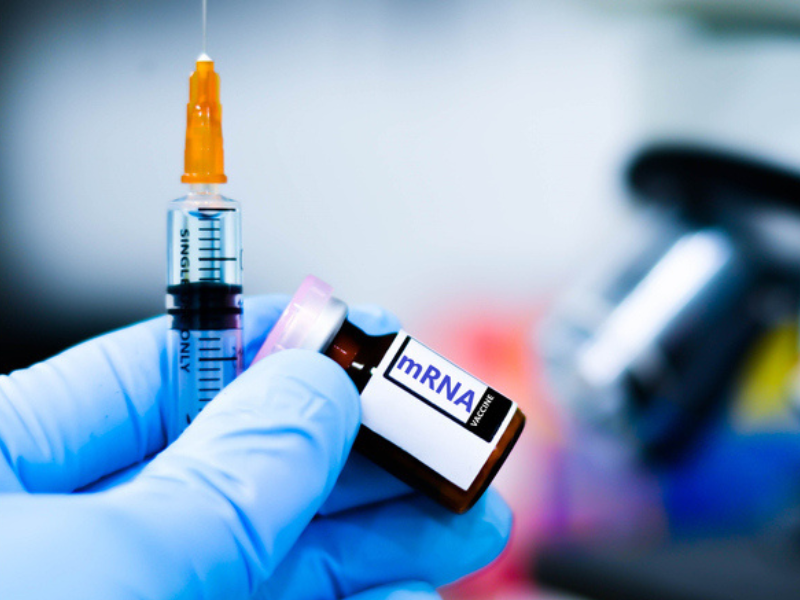The Biomedical Advanced Research and Development Authority (BARDA) is canceling $500 million of contracts to develop mRNA vaccines for flu and COVID, Health and Human Services (HHS) Secretary Robert F. Kennedy Jr. announced.
“We reviewed the science, listened to the experts,” said Kennedy in announcing the decision.
“BARDA is terminating 22 mRNA vaccine development investments because the data show these vaccines fail to protect effectively against upper respiratory infections like COVID and flu,” Kennedy said in an August 5 news release. “We’re shifting that funding toward safer, broader vaccine platforms that remain effective even as viruses mutate.”
In May, HHS canceled $590 million of contracts to develop mRNA shots against avian flu. In its recent release, HHS said it will let mRNA contracts in their final stages (Arcturus and Amplitude) run their course and allow “de-scoping of mRNA related work” (Luminary Labs, ModeX, and Seqirus) as well as other uses of mRNA technology.
As for respiratory viruses, HHS said it will be shifting funding toward “safer, broader vaccine platforms that remain effective even as viruses mutate.”
‘Stupid’ Decision
The decision unleashed a storm of reaction. Alastair Thomson, chief data officer at the Advanced Research Projects Agency for Health (ARPA-H), announced his resignation in response to the move. Thomson called the cancellations “stupid,” biotech news platform Fierce reported.
In an article for the news site, BioSpace, Jonathan Kagan, Ph.D., a distinguished scientist at Corner Therapeutics, said the removal of funding was “the latest effort to undermine this promising technology at the federal level” and that mRNA technology provides essential “tools to program our cells with instructions to fight cancer and infectious diseases.”
Biodefense Angle
Former BARDA Director Rick Bright says the decision put national security at risk.
“BARDA invested in mRNA technology precisely because it could deliver safe, scalable vaccines in record time, a capability proven during COVID,” Bright posted on X. “By dismantling that platform, we’re crippling our front-line defense, just ahead of unknown biological threats.”
Sen. Bill Cassidy (R-LA), a medical doctor, also cited biological warfare in his criticism of the contract cancellations.
“National defense today includes not only aircraft carriers and missile shields but also defenses against biological, chemical, and radiological weapons to protect both our military and everyday Americans,” wrote Cassidy in the Washington Examiner. “The only question is whether we will abandon the herculean effort made by [President Donald] Trump in his first term to develop and deploy mRNA vaccines when they are now an essential tool in our national defense. If we do abandon them, our enemies will be watching.”
Research Opportunity
Terminating the contracts is good because it allows the U.S. government to explore other options, says Jane Orient, M.D., executive director of the Association of American Physicians and Surgeons.
“I think that cancelling this funding was completely necessary and appropriate,” said Orient. “This technology has shown itself to be extremely dangerous and of dubious and, at best, limited effectiveness.
“Alternatives include better air purification and environmental sanitation, such as UV-C; immune system protection, as with adequate vitamin D levels; and repurposed drugs,” said Orient. “Given that mRNA vaccines may promote cancer by various means, [mRNA experimentation] is a very risky approach, certainly unproven.”
Urges Caution
The government should move carefully if doing mRNA research, says Twila Brase, cofounder and president of the Citizens’ Council for Health Freedom.
“Cancelling the contracts allows Secretary Kennedy to do a complete reevaluation of the vaccine program before spending $500 million in taxpayer money,” said Brase. “During COVID, we learned how little research has been done on current vaccines, and we learned the dangers of mRNA vaccines. A reevaluation of the entire program is essential and prudent.”
Messenger RNA research backfired when it led to collaboration between U.S. agencies and the Wuhan lab in communist China to create the COVID-19 pathogen, writes author John Leake.
“It’s hard for me to believe that Sen. Cassidy has remained ignorant of the mountains of evidence that the scheme he describes was, in fact, perpetrated by American and Chinese collaborators,” wrote Leake, on his Focal Points substack. “Given that he regards the Chinese Communist Party and military as adversaries of the United States, why did the U.S. NIH approve sharing cutting-edge American biotechnology with the Wuhan Institute of Virology between the years 2014 and 2020?”
Kevin Stone (kevin.s.stone@gmail,com) writes from Arlington, Texas.



